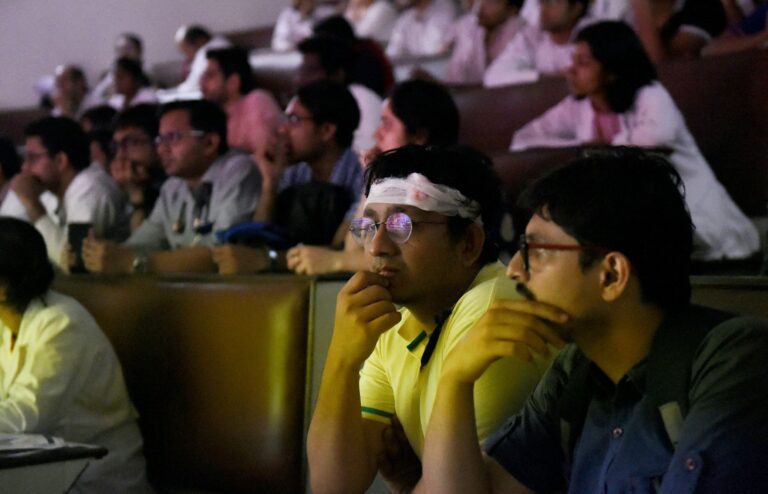
Attending medical school in places like the US, UK, Australia, or Canada might be a source of pride for many, but believe us, you can get the same advantages when attending the best medical colleges in India too.
David Gordon, president of the World Federation for Medical Education, puts it simply: “The best medical schools in India are absolutely world class.”
Not only are tuition fees in Indian medical colleges relatively lower than those in other countries, but they also offer extensive practical and clinical training across various healthcare settings, including rural and urban environments.
Ironically, despite these advantages, approximately 25,000 Indian students are pursuing medical degrees abroad. This is because many cannot afford the high fees of private institutions or secure admission to public colleges in India, as the University World News reported.
For those who do return to India to practise, passing the Foreign Medical Graduate Exam (FMGE) — a requirement mandated by the Indian government — is a significant challenge.
In 2024, 61,616 students took the exam, but only 10,269 — 16% — managed to pass.
What waits for them upon their success, however, is worth the effort.
In India, the average annual salary of doctors across all levels is around US$11,101, while specialist doctors earn US$21,275. If you’re an MBBS doctor with five years of experience up your sleeve, you should expect to be paid an average of US$8,671 per annum.
While that might not be as much as what doctors in the Western world earn, it’s a lot higher than doctor salaries in the developing world — for example, in Malaysia, doctors only earn an average of US$1,775.
International students don’t have to be worried about losing out too.
Some of these best medical colleges in India are recognised by the World Health Organisation and listed in international medical directories. This means you won’t have to worry too much about where you can practise once you graduate.
However, that’s the catch — it is only in these best medical colleges in India that you get the quality and legitimate education you need to become a successful and recognised doctor. If you enrol in one of India’s many other medical colleges, you’d best exercise caution.

Not all healthcare education is made equal, but the best medical colleges in India do better than most. Source: AFP
In 2010, Reuters found at least 69 Indian medical colleges and teaching hospitals accused of such transgressions or other significant failings, including rigging entrance exams or accepting bribes to admit students. They also revealed that one out of every six of the country’s 398 medical schools has been accused of cheating, according to Indian government records and court filings.
It’s also worth mentioning that more often than not, these colleges and teaching hospitals didn’t produce a single peer-reviewed research paper from 2005 to 2014. In comparison, the All India Institute of Medical Sciences (AIIMS), undoubtedly one of the best medical colleges in India, published 11,300 research papers in that same period.
While producing research papers isn’t a direct indicator of the quality of education at a given institution, it does raise some brows.
Samiran Nundy, a Delhi-based senior gastrointestinal surgeon, told the Telegraph newspaper, “These findings support long-standing suspicions that for many private colleges in the country, medical education is just a business.”
In these colleges, a medical education is just business. To get into these schools, it’s simply a matter of coughing out “capitation” fees, which are essentially compulsory donations required for admission, or not earning a medical degree at all.
If you’re not from or living in India, you might think that this doesn’t affect you, but it does, to some extent.
“India is the world’s largest exporter of doctors and healthcare workforce to other nations. More than 70,000 medical graduates from India (nearly 10% of the qualified doctors in India) are in the USA, UK, Europe, and the other nations,” writes Sethuraman K. Raman in an issue of Medical Education in India. “Therefore, the quality of medical education and the competence level of medical professionals from India acquire global relevance.”
Luckily, the country’s best medical colleges prove that there is hope to be had.
8 best medical colleges in India for international students
1. All India Institute of Medical Sciences (AIIMS)
If you’re interested in specialising in neuroscience, cancer, dentistry, or ophthalmology, the All India Institute of Medical Sciences (AIIMS) is a collection of autonomous government medical universities that should be your top choice.
AIIMS is ranked 127th on QS World University Rankings by Subject 2024 for medicine, making it one of the best medical colleges in India for international students. It has also been ranked first in the medical category of India’s National Institutional Ranking Framework (NIRF) 2024 for four consecutive years.
The average tuition fee for an MBBS at its 19 campuses varies between US$58 and US$261, excluding hostel and additional costs.
View this post on Instagram
2. Manipal Academy of Higher Education (MAHE)
Ranked within the top 250 on QS World University Rankings by Subject 2024 for medicine, Manipal Academy of Higher Education, also known as Manipal University, is recognised as an “Institute of Eminence” by the government of India. The university has cutting-edge facilities such as a simulation lab, an anatomy museum, and Asia’s largest health sciences library.
Attending MAHE will allow you to experience life in Malaysia, too, thanks to their twinning programme with Melaka-Manipal Medical College (MMMC). This is one way for you to kill two birds with one stone, as you’ll be able to experience two countries and add a different perspective to what you’re learning.
The total tuition for a six-year MBBS at MAHE is US$51,621 and US$85,527.
View this post on Instagram
3. Postgraduate Institute of Medical Education & Research (PGIMER)
Nestled in Chandigarh, thePostgraduate Institute of Medical Education & Research was founded in 1960 and has become a centre of excellence for postgraduate medical education in several branches, such as endocrinology, radiology, public health, surgery, neurology, and cardiology.
PGIMER has been ranked second in the medical category of NIRF 2024 for four consecutive years and in the top 350 in the QS World University Rankings by Subject 2024, making it one of the best medical colleges in India.
The total tuition for all BSc programmes at PGIMER is US$211, while an MD is around US$23,464.
4. Sree Chitra Tirunal Institute for Medical Sciences Technology (SCTIMST)
Previously known as the Sree Chitra Tirunal Medical Centre, SCTIMST is recognised as an institution of national importance in India. SCTIMST operates as a statutory body governed by the Ministry of Science and Technology, overseen by the Department of Science and Technology within the Indian government.
The institute is known for treating neurological and cardiac conditions and pioneering research in biomedical devices and technologies, making it one of the best medical colleges in India for those interested in those fields.
The average tuition fee for an undergraduate degree is US$234 to US$351
5. University of Delhi (UOD)
Founded in 1922, the University of Delhi is a collegiate public central university. Its medical school has over 20 departments, including anaesthesiology, forensic medicine, paediatrics, pathology, and radio diagnosis.
UOD is one of the best medical colleges in India to attend as it offers undergraduate (MBBS and BDS), postgraduate (MD, MS, and diplomas), super-specialty (DM and MCh), and PhD programmes.
UOD’s location is strategically perfect for international students. By being in the capital of India, you’ll have access to several medical conferences, including the International Conference on Health and Medicine, the International Conference on Healthcare and Medicine, and the Asia-Pacific Academy of Ophthalmology (APAO) Congress.
The total tuition fee ranges from US$1,290 to US$79,191.
View this post on Instagram
6. Christian Medical College & Hospital
Commonly called Christian Medical College & Hospital Vellore, this medical school is a private, Christian minority community-run medical college and hospital in Vellore, Tamil Nadu. It was founded in 1900 by Dr. Ida S. Scudder, the daughter of a second-generation medical missionary from the US.
CMC Vellore is mainly known for specific departments such as neurosciences, gastroenterology, and haematology. It’s also a national leader in treating rare blood disorders and bone marrow transplants, making it one of the best medical colleges in India for you to study if you’re interested in those fields.
Tuition for an MBBS costs around US$619 per year, while a four-year BSc in Nursing can cost about US$1,416.
View this post on Instagram
7. Banaras Hindu University (BHU)
Established in 1916, Banaras Hindu University is a collegiate and research university located in Varasani, Uttar Pradesh.
Its Institute of Medical Sciences (IMS) comprises three faculties: the Faculty of Medicine, Dental Sciences, and Ayurveda (a “natural” and holistic medical approach). In total, IMS has 33 departments in Modern Medicine, including four dentistry departments, 10 super-specialties departments, a school of nursing, and 11 Ayurveda departments.
International students are not required to sit for the university’s MBBS entrance programme.
The total tuition for an MBBS is US$1,753.
View this post on Instagram
8. Amrita Vishwa Vidyapeetham
Also known as Amrita University, Amrita Vishwa Vidyapeetham was established in 1994 in Coimbatore and now has 19 schools on nine campuses across India. Its Schools of Medicine are located in Kochi and Faridabad.
Amrita University’s Schools of Medicine are accredited by the National Medical Commission of India and the World Health Organisation. It’s also the first institution in India to get certified by the National Accreditation Board for Hospitals & Healthcare Providers, and its labs are accredited by the National Accreditation Board for Testing and Calibration Laboratories.
The total tuition for its four years and a half MBBS is US$146,651.

An estimated 1.429 billion people live in India, compared to the US (334.9 million). Source: AFP
What to expect when studying in the best medical colleges in India
All international students face their fair share of struggles.
In India, accommodation and living conditions might be an issue as university hostels may have limited space and lack the facilities that international students might expect. Some dorms lack basic amenities such as hot water, Wi-Fi, laundry services, ventilation, and even electricity supply.
Private housing, on the other hand, is a “pricier” option. They can range from US$57 to US$115 a month, whereas university hostels only cost US$5 to US$9 a month. They can be challenging to secure too, especially when international students are unfamiliar with local rental practices.
An Indian Quora user explains that the ease of accommodation searching also depends on where you’re going to be located. They also advise you to learn as much as you can about the local customs.
“Be prepared for overbearing bureaucracy, crowd behaviour, etc,” they write. “Many amenities will vary, so keep that in mind (e.g. toilets). For most folks arriving from Southeast Asia, you will find it rather similar in many aspects.”










